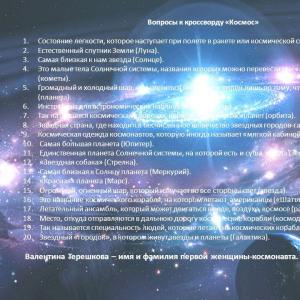Master's degree in English for beginners. Institute of Foreign Languages - Master's Degree
Instructions
Since this article is intended for those people who did not study at a school with a language focus or did not complete a bachelor’s degree in English, the first and most logical step would be to search good tutor. Finding a good private teacher is not so difficult if you have the desire and financial resources. Recommendations can be given by your friends, even those who seem to have nothing to do with the language field at all. They will certainly have other friends who have successfully prepared for passing the Unified State Exam and entered the university.
As a rule, distinctive feature A good teacher is his willingness to conduct a so-called introductory lesson, which is a conversation for 20-30 minutes, during which you can form an opinion about the teacher as a professional and as a person, draw conclusions whether his style of communication and explanation suits you , and the teacher at this time determines your level of language proficiency. Usually the trial lesson is entirely in English. Thus, after “sorting through” several candidates, you will find a tutor that suits you, classes with whom will be pleasure, not torture.
Although a tutor can provide a wealth of knowledge, including speaking practice, we must not forget about " homework". Your success largely depends on it. The first thing that comes to mind is, of course, reading. Read as much as possible, read fiction, starting with adapted short stories and ending with novels in the original author's language. Read news and scientific articles. At first, a dictionary at hand is necessary. At first you will have difficulty understanding all the words. Only after a couple of months you will begin to feel much freer due to your expanded vocabulary and new fluent reading skills. Reading fluency in English is a person's ability to read a text and grasp the main idea, meaning, and most of the thoughts instead of getting stuck on unfamiliar words. Read aloud, this will help you get used to the sound of some words, as well as grasp the peculiarities of your way of speaking.
Start mastering English literature better with adapted stories from your favorite genre. For example, it could be Agatha Christie and her short stories about Hercule Poirot. After such reading becomes more enjoyable than difficult, you can move on to adapted novels, and later to original works.

Learn poetry. Nothing influences pronunciation better than poetry in the target language. Set a goal of one verse every two weeks. Learn it by heart and say it out loud, with expression. It is a very useful practice to record yourself on a voice recorder. By listening to recordings of the same poems on the Internet performed by native speakers, you will be able to catch inaccuracies in your pronunciation and eliminate them. It is important that you like the poems. You can choose the poetry of the wonderful English poet Robert Frost or the legendary sonnets of Shakespeare, here your choice is not limited in any way, it all depends only on your desire and determination.

Sing in English. If you love foreign music, this is a definite plus. When a person sings, he automatically learns many catchphrases and specific connections. Everyone sings along to their favorite songs, so why not make the most of it? Choose what you like, open the text and sing along with your favorite performers. This practice also allows you to study slang and unofficial communication culture.

Listen as much as possible. The must-haves in this category are English-language news releases. Firstly, in them you will hear beautiful English speech with correct construction and correct pronunciation; secondly, listening to the news allows you to significantly expand your vocabulary. In addition to the news, you should also pay attention to TV series, since there is very often live speech with its “swallowing” of endings and slang words. If you have already completed or are finishing your bachelor's degree and are fairly well versed in your profession, you can try specific series. For example, “Force Majeure” (Suits, 2011-...), for doctors or criminologists - “Elementary” (Elementary, 2012-...), etc. If you are far from special terminology, such series can discourage any desire to take on something similar in the future. For those who are starting to learn a language and just want to listen to live speech, we can recommend Six Feet Under (2001-2005) and Gossip Girl (2007-2012).

Since entrance exams to master's programs are very similar to IELTS, you need to familiarize yourself with this type of exam in more detail, as well as download manuals for passing it, which, fortunately, are now in abundance on the Internet. It is also worth paying attention to training exercises because they give good skills It is in solving language tests that all areas are developed: vocabulary, listening, speaking, reading and writing skills.

Writing skills are developed through writing essays and, surprisingly, through reading. It’s not for nothing that they say: whoever reads good books, he studies; He who speaks beautifully writes beautifully. Write an essay every day on a different random topics: about a new discovery, about world peace, about your new shoes. Write about everything. A very good practice is to maintain your own English-language blog. The basic rule: write at least a little, but every day. The fact is that when we cannot correctly construct a sentence, we turn to the Internet for a hint, and immediately after that we hone our new knowledge in practice. Thus, there is very little chance that the lesson learned will be forgotten. Running your own blog is a fun and interesting idea. For example, you can publish individual philosophical posts in your LiveJournal or on another platform, or you can simply make interesting captions in English for your photos on Instagram. The choice is yours! The world opens up many opportunities, and only you can decide which ones to take advantage of.

Master's degree (English) in Moscow with the study of history. Training for Russian and foreign children, schoolchildren, teenagers, students. Please review the list educational institutions Moscow, offering master's programs (English) in the field of history, as well as with descriptions of schools, ratings, international programs, ratings, tuition fees, reviews, photos and videos. You can also contact our consultants if you have any questions. FREE enrollment services at partner institutions, limited number of places. Assistance in selecting institutions, advice on what documents need to be collected, what requirements for submission and enrollment deadlines.
MASTER'S PROGRAM
- Form of study: full-time
- Course duration: 2 academic years.
Master's programs at ION are an opportunity to develop as a successful, sought-after professional in your field, to study your priority specialty in more depth and have the opportunity to enter the international labor market. All training is conducted in English. Classes are held twice a week on weekdays from 19 to 22 hours (on Saturdays - from 10 to 17 hours).
ION offers training in the following master's programs and specialties:
- International business
It is possible to study at a partner university in France for 1 semester (Burgundy School of Business) and receive a double diploma upon graduation.
- Project management
- International finance
Provides the opportunity to obtain one of the professional qualifications: Certified Financial Analyst or Financial Risk Manager - Global Association of Risk Professionals (GARP).
- The Master of Global Public Policy (MGPP, global public policy).
Applications are submitted from May to August (you can check with your manager for exact dates). The cost of training at ION is (per 1 person):
- Master's degree = 900,000 rubles/course.
A small excerpt from the description of educational institutions in this section:
In 2009, School of public policy - Institute of Scientific Information and Social Sciences RANEPA - Russian Academy National Economy under the President of the Russian Federation was created as a faculty public administration and made the first intake of students for its own bachelor's programs, and the Institute acquired its current name in 2014. Since 2011, the institute has been included in the structure of the Institute of Public Policy and Applied Humanitarian Research of the Russian Academy of National Economy and Public Administration under the President of the Russian Federation (IGPiPGI), and already in 2012 the university earned the right to independently develop educational standards and curriculum using international Liberal Arts principles.
In 2013, at the Institute of Scientific Information and Social Sciences of the RANEPA, an innovative laboratory for scientific and practical research was created - the Center for Urban Planning Competencies, and the School of Current Humanitarian Research was opened, dealing with the problems of modern humanitarian knowledge and education.
Faculty Master's Degree foreign languages and regional studies -it is traditional in modern international educational space level of higher professional education.- The faculty's master's program is organized on the principle of creative cooperation between students and teachers, the purpose of which is to master unique courses and curricula, specially designed for the highest level of university education.
- Master's studies are based on individual approach to the needs of students.
- Master's studies involve choosing a specific area of specialization to gain deep theoretical knowledge and practical skills.
- To ensure educational process In the master's program, the faculty attracts well-known Russian and foreign specialists.
- The Master's program at the Faculty of Foreign Languages and Regional Studies offers ample opportunities for internships abroad.
- Students of part-time (evening) master's programs can combine classes with professional activities.
Dear applicants entering the master's program!
Using the following links you can view the results of the entrance test. Please note that in the lists not specified
winners and prize-winners of the Lomonosov Olympiad in linguistics, regional studies of Russia and cultural studies.
The works will be shown July 23 (Tuesday) V 11:00 at the Faculty of Foreign Languages and Regional Studies. Have your passport and pass with you!
Dear applicants entering the master's program at the Faculty of Foreign Languages and Regional Studies!
Consultation for the entrance exam will take place on Saturday 20 July V 16:00
- Linguistics – room 208
- Regional studies of Russia and foreign regional studies – room. 214
- Culturology - room 332
Areas of training and master's programs
When choosing a field of study, you can choose from 2 to 4 programs within the chosen field in order of priority. The master's program opens if there are at least 8 students. If your priority program does not have enough students, you will be assigned to the next priority program, subject to its completion.
External Master's program
(day and evening courses)
Linguistics
day department
Training programs:
- Communication theory and international relations public relations (PR)
- Comparative study of cultures and intercultural communication
- Russian language (for foreign citizens)
Linguistics
evening department
Training programs:
- Theory of foreign language teaching and intercultural communication
- Translation theory and intercultural communication
- Communication theory and international public relations ( PR)
Integrated Master's Degree for applicants with specialized education
(full-time education only)
Linguistics
Training programs:
- Linguodidactic foundations of teaching foreign languages and cultures
- Foreign language and intercultural communication in politics and diplomacy
- Management in the field of language education
- The language of professional communication in the field of management and top management
Regional studies of Russia
Training programs:
- Russia in the modern world space
Training programs:
- Sociocultural regional studies of countries and regions of Europe
- Sociocultural regional studies of countries and regions North America
- Technology for creating a positive image of the European region
- Technology for creating a positive image of the North America region
Cultural studies
Training programs:
- Comparative Heritage Studies
The Faculty Admissions Committee accepts documents from June 20 to July 20 2019 at Leninskie Gory 1, building 13-14, room 239
- Admission rules to Moscow State University for 2019
Admission plan in 2019 :
|
External Master's program |
|||||||||
|
Direction of training |
Qty budget places |
Number of contract places | |||||||
|
(written) |
|||||||||
|
30 |
35 (total number for integrated and external master's programs in Linguistics) |
linguistics in a foreign language English, French, German, Spanish or Italian (written) |
|||||||
|
cultural studies (two questions on the theory and history of culture and a lexical and grammatical test in a foreign language) (written) |
|||||||||
Master's degree
Presentation of programs
Direction "Linguistics"
Double degree programs
in the direction of "Linguistics" 
Direction "Foreign Regional Studies"
Direction "Psychological and pedagogical education"

As part of the decisions of the Bologna Process, the Institute of Foreign Languages, as well as the entire University, actually implements the European Union program, which is called the Lifelong Learning Program - Lifelong Learning Program.
The RUDN Institute of Foreign Languages provides its students with the opportunity to receive higher education full-time or part-time forms of study within the master's degree program directions 45.04.02 “Linguistics” , 41.04.01 “Foreign regional studies. European Studies - European region”,44.04.02 “Psychological and pedagogical education” .
Master's degree specialization in Russian and English languagesin the direction of “Linguistics” - “Communication Theory and International Public Relations (PR)”- allows students to gain exclusive knowledge andinternational PR experience. Next is possible continuation of postgraduate studies at RUDN University.Postgraduate specialty 02/10/04 - “Germanic languages”.
The Institute implements:
. jointly with the Catholic University of Lille (France) a master’s program in “Linguistics”, with a master’s specialization in “Communication Theory and International Public Relations (PR)” and “Trilingual International Relations”;
. jointly with Edinburgh Napier University (UK) the Master of Science in Intercultural Business Communication program.
Studying under these programs, students of the RUDN Institute of Foreign Languages receive a master's degree in Linguistics, as well as a diploma from a foreign partner university corresponding to the chosen program.
IFL offers full-time training in Russian and English in the master's program in the direction
41.04.01 “Foreign regional studies. European Studies - European Region» with in-depth training in the field international relations. The profile of specialized training is “European region”.
In the direction of 44.04.02 "Psychological and pedagogical education" The Institute trains managerial psychologists. The Institute announces admission to the Master's program “Psychological and pedagogical foundations of organizational and managerial activities.”
Psychological and pedagogical education is one of the most prestigious areas of training specialists in developed and developing countries peace. It provides an opportunity to gain a wide range of knowledge and skills in the field of psychology, pedagogy, general management and personnel management.
The Institute of Foreign Languages provides an opportunity for everyone to master foreign languages. The Institute successfully carries out any additional educational programs in foreign languages.
For students of the Institute and outside listeners, an additional program is being implemented vocational education“Translator in the field of professional communication”, which includes in-depth study foreign languages and mastering translation skills. Students/listeners who have entered the “Translator in the Field of Professional Communication” program study foreign languages to the extent that guarantees their fluency in the chosen foreign language. Students also successfully master the skills and abilities of translation in their specialty. The range of languages studied varies depending on the chosen direction or future specialization. Upon completion of training, students/listeners who have fully mastered the “Translator in the Field of Professional Communication” program and successfully completed qualification tests, a qualification diploma of a translator in the field of professional communication is issued. The program format is 2 and 4 years.
The Institute offers a wide range of programs in foreign languages.







